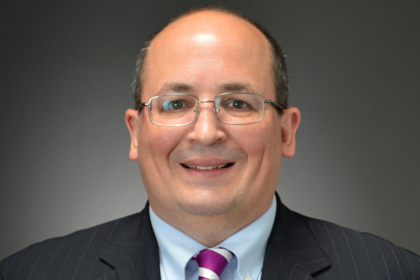Aging baby boomers want to stay independent and live in their own homes as long as possible, but aging also increases the prevalence of depression and dementia.

Michael LaMantia, M.D., Associate Professor of Medicine, Larner College of Medicine at UVM (Photo: Larner COM Design & Photography)
Aging baby boomers want to stay independent and live in their own homes as long as possible, but aging also increases the prevalence of depression and dementia.
At the same time, few mental health professionals specialize in treating the geriatric population, leaving many of those patients to seek treatment from general practitioners, who are often challenged to handle their patients’ complex medical conditions. Some older patients are reluctant or physically unable to get out to see a doctor, so they may go untreated.
A new study by Indiana University (IU) School of Medicine researchers – authored by geriatrician Michael LaMantia, M.D., M.P.H., now of The Robert Larner, M.D. College of Medicine at The University of Vermont (UVM) – has found that use of a mobile workforce of care coordination assistants trained to work with older adults in their home environment can help reduce the severity of their depression. The study, published November 1, 2016 in the journal Clinical Interventions in Aging, included 773 adults previously diagnosed with depression, dementia or both. The researchers determined that participants’ symptoms decreased after intervention with the Aging Brain Care (ABC) Medical Home program, which was designed to supplement the work of primary care providers with more readily available workers.
“We need ways of expanding our workforce of people who are skilled in caring for older adults,” says LaMantia, associate professor of medicine and the former medical director of the ABC Medical Home program developed at IU’s Center for Aging Research and Eskenazi Health in Indianapolis.
LaMantia came to the Larner College of Medicine in June 2016 to head its new geriatrics unit in the Division of General Internal Medicine. He says that the new U.S. healthcare system’s shift towards focusing on overall patient health needs and improved outcomes will lead to a demand for providers who can produce those outcomes, particularly for the nation’s growing population of seniors.
“This study provides evidence that we can use a workforce trained in geriatric principles to extend the reach of our geriatricians and providers trained in caring for older adults to treat depression and other complex conditions,” he says.
Research has shown that two percent of older adults living in the community suffer from major depression, while 9.8 percent experience minor depression, according to the IU study. Rates are higher for this population if they are hospitalized, with minor depression affecting 14 to 25 percent of elders.
Patients in the study participated through Eskenazi Health, a public hospital with 10 community health centers in and around Indianapolis, but the ABC Medical Home caregivers saw them in a variety of settings. The study measured participants’ level of depression using a standard system known as the Patient Health Questionnaire-9, or PHQ-9.
“It was very important to use the equivalent of a blood pressure cuff to measure their depressive symptoms in this study,” LaMantia says.
Over six months, patients with PHQ-9 scores higher than 10 experienced an average decline of more than 50 percent in their baseline score – an average drop of 7 points, the study found. In just one month, women in the study saw an average drop of 4.5 points in their scores, while men improved more slowly in the shorter time frame, with scores dropping 1 point on average.
The ABC Medical Home model seeks insight into the daily experiences of these patients outside of doctor’s offices and hospitals and within the community where they spend most of their time, LaMantia says. “We need to engage with our patients and our families in those locations.”
The care coordinator assistants are mostly high school and two-year college graduates who exhibit a skill and desire for working with older adults. Their success depends on the relationships they build with patients, LaMantia says.
They ease the burden on primary doctors, who see more and more patients today for problems that in the past were handled at the hospital or by a specialist.
“We’re not giving more to do to the primary care doctor,” LaMantia says. “We’re trying to take things off of their plate.”
The Larner College of Medicine’s new Section of Geriatric Medicine aims to expand care offerings for seniors, grow a clinically-oriented research program that studies conditions that affect older adults, and offer robust training opportunities for physicians and other providers in geriatrics. In his new role, LaMantia will also work with the UVM Medical Center’s Memory Center in Colchester, Vt.
Link to the IU School of Medicine press release.